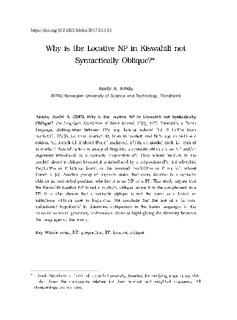| dc.contributor.author | Amidu, Assibi Apatewon | |
| dc.date.accessioned | 2017-11-13T09:37:48Z | |
| dc.date.available | 2017-11-13T09:37:48Z | |
| dc.date.created | 2017-05-15T19:13:27Z | |
| dc.date.issued | 2017 | |
| dc.identifier.citation | Linguistic Association of Korea Journal. 2017, 25 (1), 1-27. | nb_NO |
| dc.identifier.issn | 1225-7141 | |
| dc.identifier.uri | http://hdl.handle.net/11250/2465718 | |
| dc.description.abstract | Kiswahili, a Bantu language, distinguishes between PPs, e.g. kutoka soko-ni 'Cl. 0 COP-a from market-Cl. 17/26, i.e. from market, lit. from in market' and NPs, e.g. m-pishi w-a soko-ni 'Cl. 1-cook Cl. 1 SM-COP-n of market-Cl. 17/26, i.e. market cook, lit. cook of in market.' According to one group of linguists, a syntactic oblique is an NP and/or argument introduced by a syntactic preposition (P). Thus sokoni 'market, in the market' above is oblique because it is introduced by a preposition (P): the adverbial P-a/COP-a or P kutoka 'from', or the nominal P-n/COP-n or P wa 'of', whose P-root is {a}. Another group of linguists states that every locative is a syntactic oblique in postverbal position, whether it is an NP or a PP. The study argues that the Kiswahili locative NP is not a syntactic oblique unless it is the complement in a PP. It is also known that a syntactic oblique is not the same as a lexical or inflectional oblique case in linguistics. We conclude that the use of a 'colonial reductionist hypothesis' to determine obliqueness in the Bantu languages, in the name of universal grammar, undermines efforts at highlighting the diversity between the languages of the world. | nb_NO |
| dc.language.iso | eng | nb_NO |
| dc.publisher | The Linguistic Association of Korea | nb_NO |
| dc.rights | Navngivelse-Ikkekommersiell 4.0 Internasjonal | * |
| dc.rights.uri | http://creativecommons.org/licenses/by-nc/4.0/deed.no | * |
| dc.title | Why is the Locative NP in Kiswahili not Syntactically Oblique? | nb_NO |
| dc.type | Journal article | nb_NO |
| dc.type | Peer reviewed | nb_NO |
| dc.description.version | publishedVersion | nb_NO |
| dc.source.pagenumber | 1-27 | nb_NO |
| dc.source.volume | 25 | nb_NO |
| dc.source.journal | Linguistic Association of Korea Journal | nb_NO |
| dc.source.issue | 1 | nb_NO |
| dc.identifier.doi | 10.24303/lakdoi.2017.25.1.1 | |
| dc.identifier.cristin | 1470375 | |
| dc.description.localcode | Copyright © The Linguistic Association of Korea. Open Access article under the Attribution-NonCommercial 3.0 Unported CC BY-NC 3.0 license (https://creativecommons.org/licenses/by-nc/3.0/) | nb_NO |
| cristin.unitcode | 194,62,60,0 | |
| cristin.unitname | Institutt for språk og litteratur | |
| cristin.ispublished | true | |
| cristin.fulltext | original | |
| cristin.qualitycode | 1 | |

